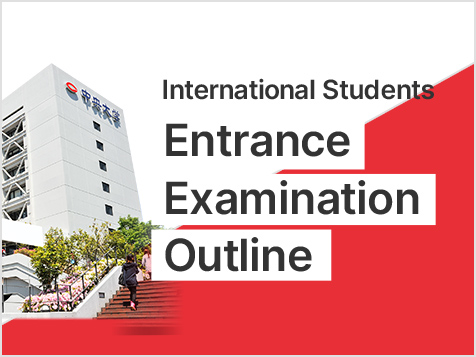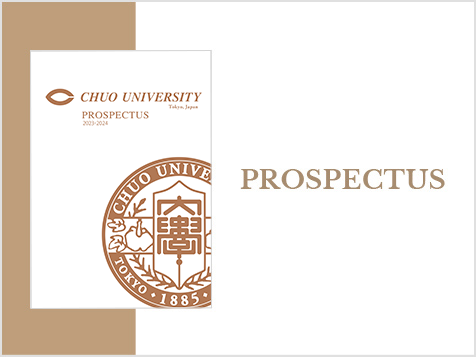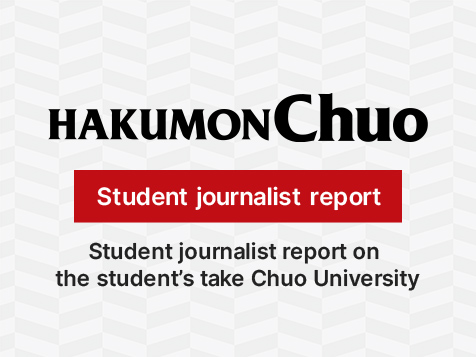Admissions
International Residences FAQ
International Residences
- 1 Are there international residences at Chuo University?
-
There are two international residences: “International Residence Chuo” on the Tama Campus and “Seiseki International Residence,” about 8-minute walk from Seiseki Sakuragaoka Station on the Keio line. Undergraduate students, graduate students, international exchange students, and research students enrolled at Chuo can live in the IRC and the Seiseki International Residence (Distance-learning division students and non-degree students are not acceptable).
International Residence Chuo (IRC)
IRC accepts applications twice a year (April enrollment and September enrollment) at the International Center. Please check the website for April enrollment in early November and for September enrollment in early June. Applications will be conducted online and residents will be decided by screening of documents and an interview (current students only). When applications begin, you can apply from the bottom of the application guidelines website.Seiseki International Residence
Seiseki International Residence is a residence with private rooms for Chuo students, co-managed with Kyoritsu Maintenance. For inquiries and applications, please contact Kyoritsu Maintenance (010-81-3-5295-7889). - 2 Do the residences include meals?
-
Both IRC and Seiseki International Residence (co-managed with Kyoritsu Maintenance) are residences where students cook their own meals. Please use the common kitchen in the IRC and the kitchen in the private rooms in the Seiseki International Residence, or use university cafeterias or nearby restaurants.
1. Kyoritsu Maintenance has student residences with meals. For inquiries, please directly contact Kyoritsu Maintenance.
2. College Town (Hachioji-city) managed by Friend Park has student residences with meals.
- 3 Are there shops near the residences?
-
Besides the university Co-op, near the IRC are a pharmacy Welcia (2-minute walk), Starbucks (1-minute walk), Seven-Eleven (1-minute walk), Family Mart (3-minute walk), and an OK discount store (about 15-minute walk).
Around Seiseki International Residence, there are Kodaira Udon (1-minute walk), Lawson (2-minute walk), and 8-minute walk, near Seiseki Sakuragaoka station, there are many shopping buildings such as Keio Department Store, OPA, and many more shops.
About IRC
1 Residents
- 1-1. Please tell me about the residents.
-
<In the first semester of 2024>
【The ratio of foreign nationals】
About 60%
There are students from 20 countries (Korea 46, China 26, US 12, UK and France 8 each, Taiwan 7, and others)【The ratio of men to women】
men 45% : women 55%【The ratio of students’ years*】
1st year students: about 50%, 2nd year students: about 30%, 3rd year students: over 10%, and about 10 students in the 4th year【The ratio of faculties*】
Global Management: over 30%, Letters, Economics, and Commerce: 20% each, and Policy Studies: about 10%*excluding exchange students
2 Applications (☆: excluding exchange students)
- 2-1. ☆ How can I apply?
-
According to the Application Guidelines posted on the University website, please apply with the designated procedure within the application period. For further details, please see the Application Guidelines:
<April move-in schedule (reference)>
- 1st application【current students who wish to be UL or IRC supporter】: Late November
- 2nd / 3rd / 4th applications【new students】: Late January to Mid-March
New students who are accepted to Chuo University can apply only once among the above applications.
<September move-in schedule (reference)>
- Fall application【new students and current students】: Late June
- 2-2. Can anyone live in the IRC?
- Undergraduate students, graduate students, international exchange students, and research students enrolled at Chuo can live in the IRC (Distance-learning division students and non-degree students are not acceptable).
- 2-3. ☆ What are the selection criteria?
-
IRC wants students who understand the concept of the IRC: “to facilitate interculturality among students from various backgrounds through daily life living together” and who are highly motivated to join the residence management that is conducted by all residents, in a positive manner and are committed to interactions. We will select residents based on what applicants tell us about their intentions and motivation for activities in the IRC. Therefore, it is important to have a vision of and commitment to the activities in the IRC.
*Entrance exam results, academic performance, and where you live are not included in the selection requirements.
*To realize an optimum environment, residents are required to participate in the events held in the IRC (various events, meetings, etc.). The IRC does not provide just housing. Students who do not have the intention or motivation for interaction should refrain from applying.
- 2-4. What is the acceptance rate for the resident selection?
- The acceptance rate is not disclosed because it varies depending on the number of international exchange students to be accepted and depending on gender as recruitment is separate for men and women. In addition, the numbers to be accepted for April entry and September entry differs greatly.
- 2-5. Can I choose my room?
- No. The University will assign your room. Conditions may vary depending on the floor and room location, but you cannot change that room.
- 2-6. ☆ Results of entrance exams of other universities will be announced in late March. Can I still apply for the 4th application?
- If you are already accepted to Chuo, you can apply even if you take entrance examinations for other universities. Please enter the details of the other universities you apply for in the designated field in the entry application. Taking entrance examinations for other universities does not affect the results of the application of the IRC. But depending on the situation, we select substitutes to fill vacancies, so please cooperate to enter the information.
3 Move-In Procedures (☆: excluding exchange students)
- 3-1. How do I pay the monthly rent?
- Your rent payment will be automatically deducted from your designated bank account in Japan. For international students who have difficulty opening a bank account, payment by credit card is acceptable.
- 3-2. Tell me about the rental bedding set.
- Rental fee is 1,760 yen (tax incl.) (monthly), plus a set-up fee: 770 yen (tax incl.) (first month only). A lump sum payment for the contract period is required and all residents need to rent a bedding set (7 sets: quilt, bed pad, pillow, blanket, quilt cover, sheet, and pillow case). The fee includes the cleaning of sheets and covers twice a month, and storage of a winter quilt during summer.
- 3-3. ☆ Do I need a joint and several guarantor?
- You need a joint and several guarantor in Japan, but you can also use a guarantor company (19,380 yen/year).
- 3-4. ☆ Can I cancel the contract after moving-in approval?
- If you cancel after completing the move-in procedure, you will be charged the amount equivalent to one month's rent (64,600 yen). In principle, you cannot move out early after moving in (the start date of the contract).
- 3-5. Can I ask my family to help me on move-in day?
- Only on move-in day, family members (a limited number) can enter the IRC. One family member of the same gender as the resident is permitted to enter the room to help moving. Other family members need to wait in the common area. In the IRC, RA/UL can help you with your luggage, so there is no problem if you move-in without your family’s help.
- 3-6. Can I bring my belongings by car on move-in day?
- Yes, but many residents arrive by car. As soon as you finish unloading your belongings from the car, please move to a nearby pay parking lot. Pay parking lots around the IRC may be full depending on the time of day. In that case, you need to park farther away.
- 3-7. Do I have to move my certificate of residence when moving in?
- Within 2 weeks after moving in, please complete procedures, such as resident registry at the Hachioji City Office. By law, you are required to establish residency in the region where you live.
4 Period of Residence (☆: excluding exchange students)
- 4-1. ☆ Can I extend the period of residence?
- In principle, the period of contract is one year, however, residents can extend the period. After 2nd year, residents are required to have an extension screening and serve as an RA, UL, or IRC supporter for the IRC management.
- 4-2. ☆ If I am planning to study abroad, can I shorten the period of the contract?
- In principle, you cannot change the period of the contract. Those who plan to move out early due to studying abroad should consult us at the time of application (for continuing residents at the time of the extension screening). Only for academic reasons, we will shorten the period of the contract in advance.
5 Rules and Regulations
- 5-1. Can I smoke in the IRC?
- Smoking is prohibited both inside and on the grounds of the IRC. Except in designated areas, smoking is prohibited on campus (There are two smoking areas on the Tama Campus, and both are a little far from IRC).
- 5-2. Can I drink alcohol in the IRC?
- You can drink alcohol in the IRC, but the IRC residents must sign a pledge regarding alcohol use. Please refrain from behaviors that trouble other residents. Drinking by persons under 20 years old is strictly prohibited.
- 5-3. Is there a curfew?
- No, but when you return after 21:00, enter your room quietly so as not to disturb others in your unit.
- 5-4. Can I stay away overnights?
- Yes. However, in preparation for emergency contact during disasters, when you stay away overnight or return home, please submit a temporary leave form to the Front Office in advance (Submission is online).
- 5-5. Can I invite non-residents such as friends or family?
- Entry into the IRC by non-residents is prohibited. Family members of residents can visit only the common area on the fifth floor with advance permission.
6 Life and System
- 6-1. Is there a Resident Manager?
- There are English speaking manager and staff in the Front Office on the 5th floor of the IRC. Office hours are 8:30~21:00. It is closed on Sundays, national holidays, summer vacation, and New Year holidays.
- 6-2. Can I consult the Front Office regarding sudden illness or injury?
- First-aid kits and Ice-non (cool pad pillows) are available at the Front Office. Minor injuries can be treated, but there are no regular medicines. Please prepare and keep medicines on your own. For serious injury or poor health, you will consult external medical institutions. If the symptoms are potentially infectious, in principle, you will be asked to stay in a spare room.
- 6-3. Please tell me about the unit.
- Each unit contains 6 members in principle, and among them there is a unit leader (UL). With a UL as a core member, unit members conduct activities, such as shopping, cooking and eating together. Twice a month, all members should have a meeting (exchange meeting).
- 6-4. How are RA/UL selected?
- In principle, 2nd year or above current students will be recruited as RA/UL. If you are not RA/UL when you first move-in, why not give it a try after moving in?
- 6-5. Are there events in IRC?
- Yes. Every month, events are held with RAs in charge of events as core members. Please be sure to participate in the IRC official events.
7 Facilities and Equipment
- 7-1. What is provided in the IRC and what are residents expected to provide when moving in?
- Your belongings should be limited to what is necessary, and please buy things after moving in. There are tableware, pots, kettles, and other cookware in the common kitchen on the fifth floor, and items that can be checked out from the Front Office are: iron, ironing board, handy vacuum cleaner, and Ice-non (cool pad pillows). Things you need to bring are clothes, laundry detergent, shampoo, a hair dryer, food, and seasoning. Depending on your lifestyle there will be various necessities (if you don’t use a clothes dryer, you may need a pole or clothesline).
- 7-2. Can I watch TV in my room?
- There is a TV socket in private rooms, so you can watch TV, but you need to pay the NHK reception fee. You can watch terrestrial channels only (satellite channels such as BS are not available).
- 7-3. Can I access LAN Internet in my room?
- You can access both wired and wireless LAN in your room. You don’t need a wireless router, but please prepare a LAN cable if necessary.
- 7-4. Can I cook in my room?
- Cooking in your room is prohibited. In principle, use the common kitchen on the fifth floor for cooking. There is a small kitchen in each unit, but it is only for simple cooking, such as reheating.
- 7-5. How much does the laundry cost?
- Washing machine 200 yen per cycle, dryer 100 yen / 30 minutes. There is no automatic detergent or softener system (please check the timing and add these yourself).
- 7-6. Can I bring a bike or motorcycle?
- Pre-registration is required for bicycles and motorcycles. Those who wish to use the cycle parking lot need to submit an application form for cycle parking at the Front Office. Motorcycle parking is charged (1,100 yen (tax incl.) a month). Bicycle parking is free of charge, but if there are many applicants, you may have to park in an area without a roof.
- 7-7. How can I receive mail and packages?
- There are mail boxes for each resident. For a large package, you can use the delivery lockers. However, refrigerated or frozen foods cannot be stored in the delivery lockers. Please adjust the delivery time so that you can meet the delivery (The management office will not temporarily store deliveries).
- 7-8. Can I take a tour of the IRC?
- We are not offering individual IRC tours, but there are some opportunities for tours, such as campus tours and open campus.
8 Departure month procedures
- 8-1. What is the procedure when I move out?
- Please submit the move-out form by one month prior to the final month of the contract. You cannot shorten the period of the contract.









